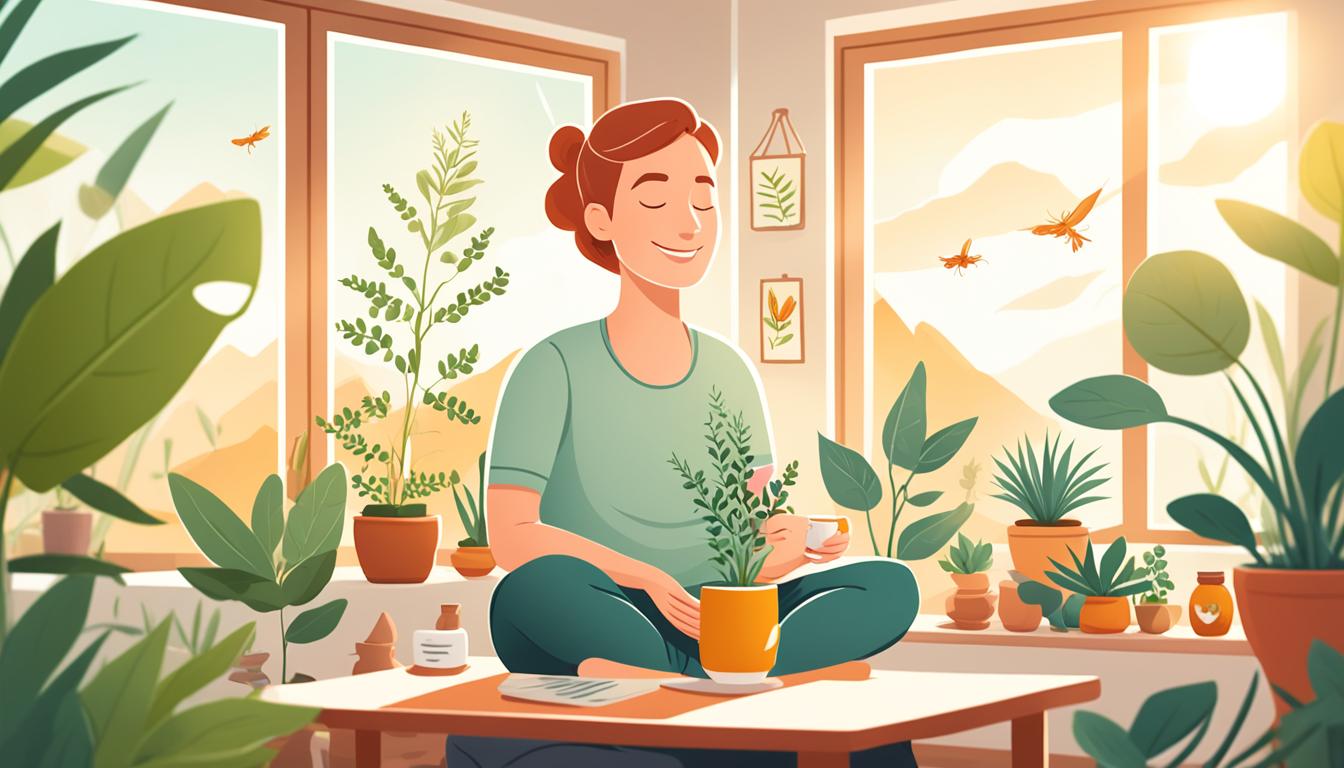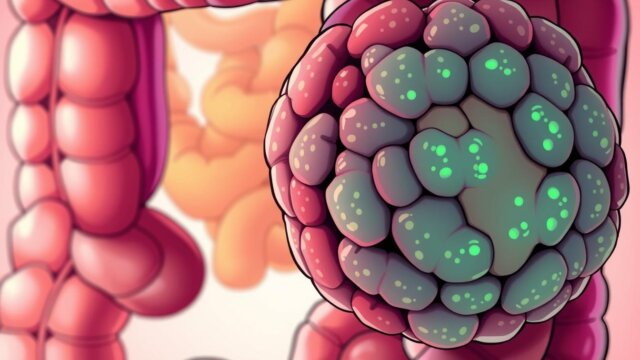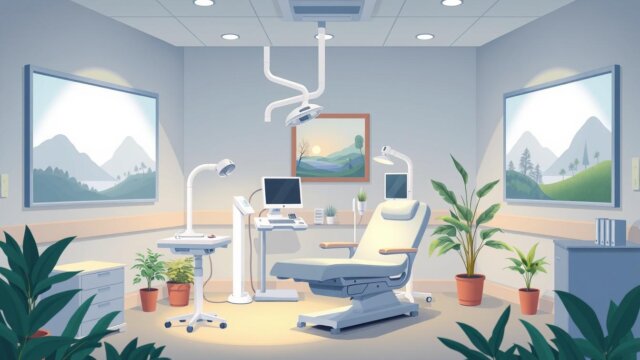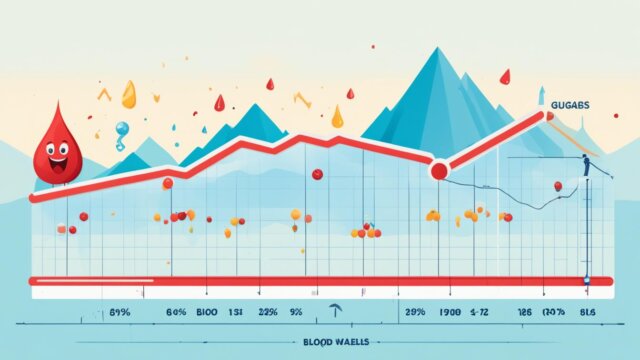FTC disclaimer: This post may contains affiliate links and we will be compensated if you click on a link and make a purchase.
About 1 in 4 adults in the U.S. have felt short of breath at some time. This issue can be tough, but there are ways to feel better at home without medicine. We’ll look at what causes shortness of breath, share ways to handle it, and talk about natural ways to keep your lungs healthy.
Key Takeaways
- Shortness of breath, or dyspnea, is a common condition that can be caused by a variety of underlying factors.
- Home remedies like black coffee, ginger, and steam inhalation can help alleviate mild to moderate breathlessness.
- Breathing exercises, such as pursed-lip breathing and diaphragmatic breathing, can improve lung function and reduce respiratory distress.
- Lifestyle modifications, including maintaining a healthy weight and quitting smoking, can also contribute to better respiratory health.
- Complementary therapies, like essential oils and herbal supplements, may offer additional support for managing shortness of breath.
What is Shortness of Breath?
Explaining Dyspnea and Its Causes
Shortness of breath, also known as dyspnea, can be mild or severe. It can make breathing hard and uncomfortable. Many things can cause it, like lung problems, heart issues, being overweight, anxiety, or pollution. Finding out why you’re having trouble breathing is key to getting the right help.
Healthy people might breathe harder when they’re exercising or in very hot or high places. But if you’re suddenly having trouble breathing a lot, you should see a doctor. This could mean you have a serious condition like heart failure or COPD. The COVID-19 virus also makes people feel short of breath.
Some studies suggest that using a fan might help with shortness of breath. But a 2020 study found that caffeine doesn’t really help with breathing problems.
Causes of Shortness of Breath | Description |
|---|---|
Lung Conditions | Asthma, COPD, Pulmonary Fibrosis |
Cardiac Issues | Heart Failure, Heart Attack, Pulmonary Embolism |
Anxiety and Breathing | Panic Attacks, Stress-Induced Breathlessness |
Environmental Factors | Air Pollution, Allergens, Extreme Temperatures |
Obesity | Excess Weight Placing Pressure on the Lungs |
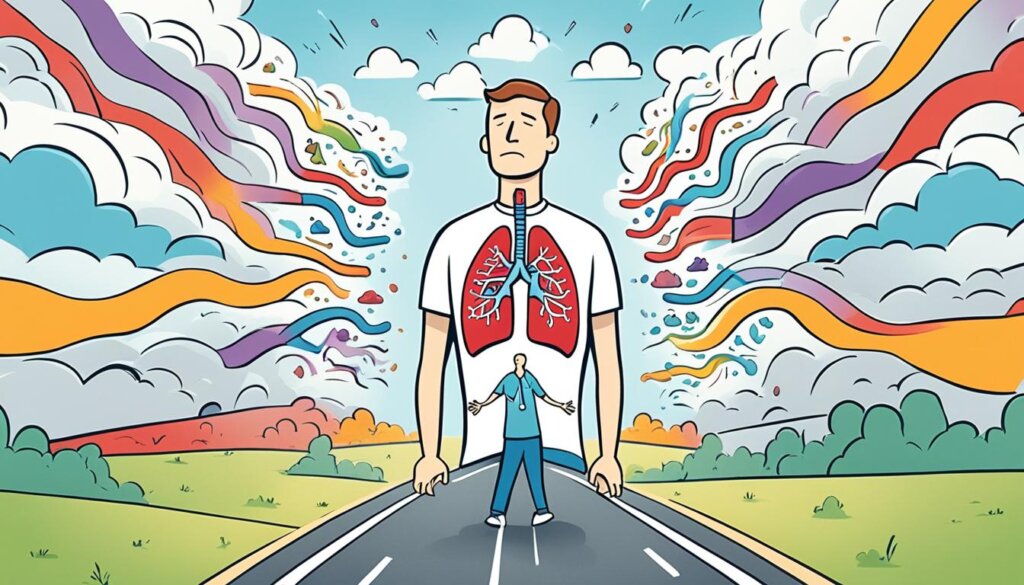
If you’re having trouble breathing, look out for signs like chest pain or blue lips. You should also see a doctor if you’re having trouble breathing when you sleep or if your feet and ankles are swelling. Doctors might do tests like blood work or imaging to figure out what’s wrong.
“Shortness of breath, especially when sudden and severe, should prompt a visit to a doctor, as it can be a warning sign of serious underlying conditions.”
If you’re suddenly feeling short of breath and it’s not normal for you, see your doctor. If your symptoms don’t get better or you have chest pain, get help right away. Eating well and exercising can help if you’re overweight and short of breath. Quitting smoking is also important if you have COPD or other lung problems. Try to avoid bad air and see a lung specialist if you have COPD or fibrosis.
Pursed-Lip Breathing Technique
A simple way to help with shortness of breath is pursed-lip breathing. This method slows down your breathing. It makes each breath deeper and more useful. Exhaling through pursed lips is great for people with COPD or feeling anxious and short of breath.
This technique makes breathing easier and less hard on your breathing muscles. It helps you do more activities or exercise. It also gets rid of old air in your lungs.
With regular practice, pursed-lip breathing can clear out old air in your lungs. It makes your lungs work better and helps your body get more oxygen.
Pursed-lip breathing can be part of a program to help people with lung problems, like COPD. Start doing it when you’re relaxed. Doing it often can make your lungs work better over time.
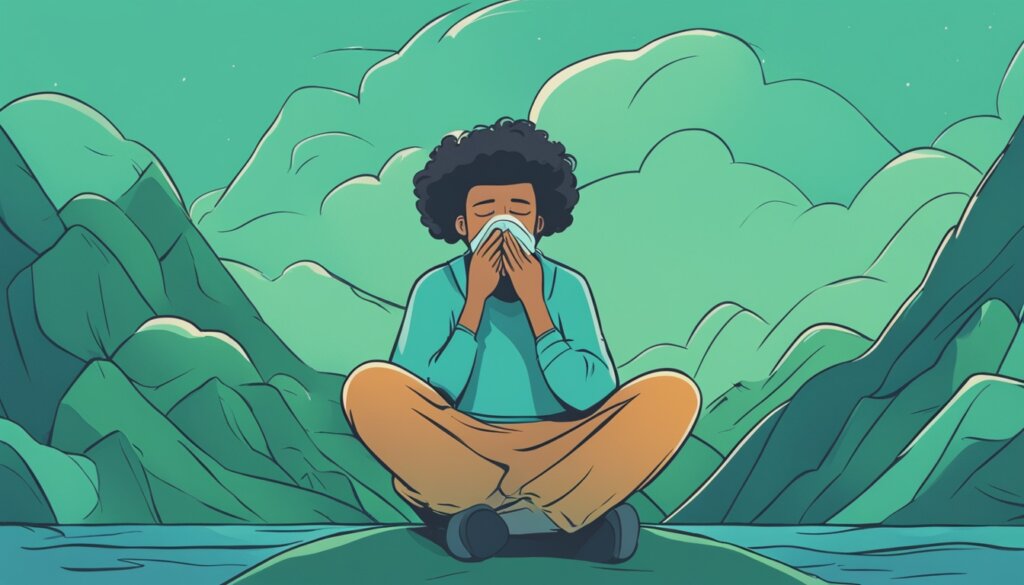
This breathing method is safe for most people. But, if you have a lung condition like COPD, talk to a doctor before trying it. It can make your lungs bigger, helping you exercise better and reducing stress by giving your body more oxygen.
Diaphragmatic Breathing Exercises
Harnessing the Power of Your Diaphragm
Diaphragmatic breathing, or belly breathing, is a great way to help with shortness of breath. It uses the diaphragm, the main muscle for breathing, to improve how we breathe. Studies in 2019 showed it made the chest bigger and cut down on breaths for people with COPD. By breathing into your belly and fully exhaling, you can make your lungs bigger. This means you breathe in better, get more oxygen, and breathe easier. Learning this can really help if you often feel out of breath.
It also lowers blood pressure and heart rate. But, if you have COPD or other lung problems, using your diaphragm might be harder. Still, with practice, it can be a big help in dealing with shortness of breath. It relaxes the body and helps muscles work better when you exercise. It also makes your blood oxygen levels go up and helps get rid of gas in your lungs. Plus, it can lower your blood pressure and heart rate.
Starting with five to 10 minutes of diaphragmatic breathing, three to four times a day, can make it a habit. Using your diaphragm can give you more control over your breathing. This can help you feel better when you’re short of breath.
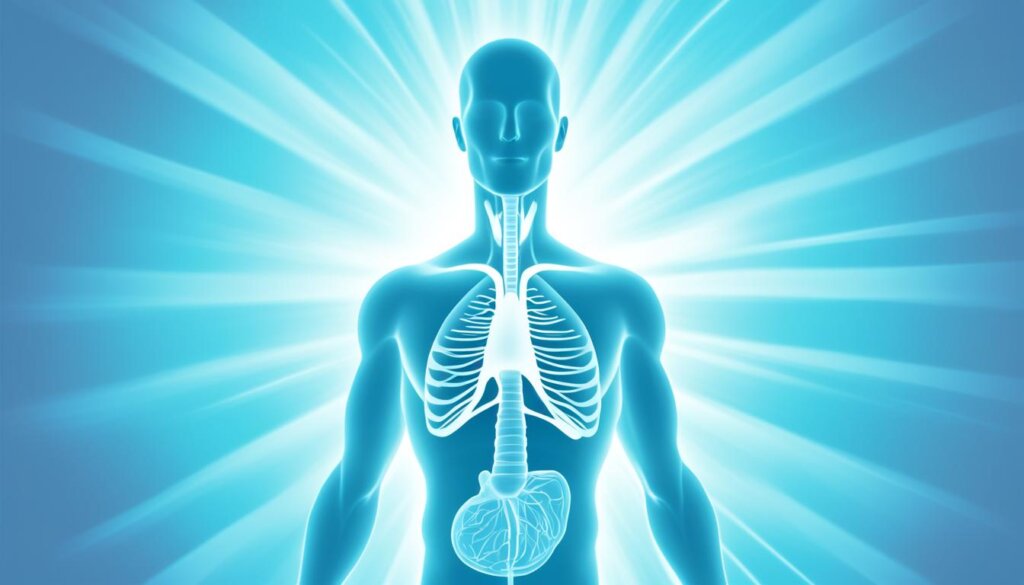
“Focusing on your breath can provide a sense of calm and control, even in the midst of breathlessness.”
Positional Remedies
Certain body positions can ease shortness of breath at home. The tripod breathing position involves sitting forward with your elbows on your knees or a table. This opens up your chest for better lung expansion. Standing with a supported back or arms also helps improve airflow. A comfy, relaxed sleeping position with your head up can help too.
Good posture is important. Sitting forward and standing with support can open your airways for easier breathing. Stay away from slouching and positions that limit chest and belly movement.
“Certain body positions can help create more space for the lungs to expand, promoting better airflow and alleviating shortness of breath.”
Try different positions to see what works for you. Listen to your body and adjust as needed. With some trial, you can find the best postures for your breathing.
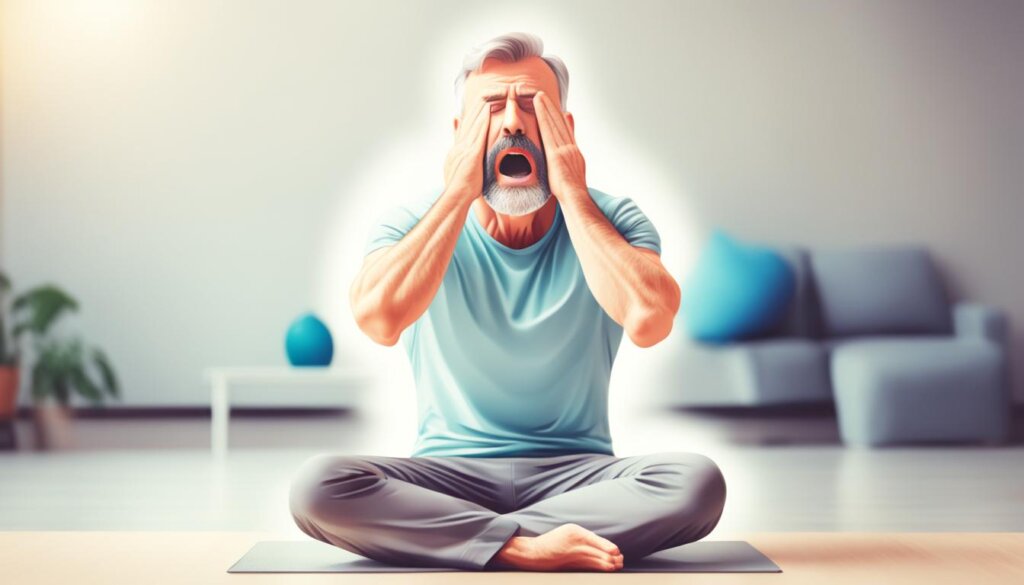
While changing positions can help now, fixing the root cause is key for lasting relief. Talk to your doctor to create a plan that includes positions, treatments, and lifestyle changes.
Home Remedies for Shortness of Breath
When you’re short of breath, try these natural home remedies for relief. Inhaling steam with eucalyptus oil can help clear out mucus and make breathing easier. Drinking black coffee might also help, as caffeine relaxes the airway muscles. Plus, eating fresh ginger or adding it to hot water can fight inflammation and viruses, easing breathing problems.
Drinking plenty of water is key for your lungs too. Simple actions like pursed-lip breathing can really help with shortness of breath. Each deep breath brings comfort. Sitting near a fan can also help by making you feel cooler, which can ease breathlessness.
These natural ways to help your breathing are easy, and don’t use drugs. Adding them to your daily life can give you relief and support your breathing health.
Remember, while these home remedies can be useful, they shouldn’t replace what your doctor says. If you keep feeling short of breath or it gets worse, see a healthcare provider. This is very important if you have conditions like asthma or COPD.
Lifestyle Modifications
Making some lifestyle changes can really help if you often feel short of breath. Quitting Quitting Smoking and staying away from secondhand smoke is key. Smoking or being around secondhand smoke often leads to lung infections and long-term breathing problems.
Also, try to avoid things in the environment that make breathing hard. This means staying away from things that can make allergies or air pollution worse.
Keeping a healthy Weight Management is also very important. Being overweight can make breathing harder, especially when you’re active. Eating well and staying active can help your lungs work better and keep your heart healthy.
Regular exercise is great for people who have trouble breathing. It’s recommended to do at least150 minutes of moderate exercise each week. This helps keep you fit and improves how well your lungs work.
By changing your lifestyle, you can help manage your shortness of breath and get better at breathing.
When to Seek Medical Attention
Home remedies can help with mild or occasional shortness of breath. But, some situations need quick medical help. Sudden, severe, or unexplained breathlessness with chest pain and tightness might be a medical emergency. It’s important to see a doctor fast.
If you’re having trouble breathing, call 911 or your local emergency number right away. Do what you can to help yourself while you wait for help.
Signs of breathing difficulty include fast breathing, trouble lying down, feeling anxious, confused, dizzy, or lightheaded. Other signs are fever, cough, nausea, chest pain, and blue lips or nails. Serious issues like a blood clot in the lung or a heart attack can also cause breathing problems.
To avoid breathing problems, carry an epinephrine pen for severe allergies. Avoid allergy triggers and don’t smoke. Keep vaccinations up to date, stay healthy, and wear a medical alert tag if needed.
If you’re having new or worse breathing trouble, or if it comes with chest pain, fever, or getting worse, get medical help right away. Some people find it hard to breathe even with simple activities like climbing stairs. Wheezing can mean you have asthma, which makes breathing hard.
“Don’t hesitate to call for help if you experience sudden, severe, or unexplained breathing problems. Your health and safety are the top priority.”
Home Remedies for Shortness of Breath
Shortness of breath, or dyspnea, can be a worrying sign. It can happen for many reasons. Luckily, there are natural ways to help at home.
The pursed-lip breathing method is one good way. Breathe in through your nose and out through pursed lips. This slows your breathing and helps you feel better. Try this 10-20 times if you’re having trouble breathing.
Diaphragmatic breathing, or belly breathing, is also helpful. Take deep breaths and focus on your belly expanding. This can make breathing easier.
Using a handheld fan to cool your face can also help. The cool air can calm your breathing. Drinking steam from a hot shower or a warm drink can also clear your airways.
A cup of black coffee might help too, especially if you have asthma. It can relax your airway muscles. Ginger is another option. It can ease shortness of breath from infections.
These home remedies can help for a while, but if it’s serious, see a doctor. If you’re not getting better or have other symptoms, get medical help.
Home Remedy | Benefit |
|---|---|
Pursed-Lip Breathing | Slows breathing pace and provides comfort |
Diaphragmatic Breathing | Improves respiratory function |
Handheld Fan | Calms and eases breathing discomfort |
Inhaling Steam | Breaks down mucus and clears air passages |
Black Coffee | Reduces tightness in airway muscles |
Ginger | Alleviates shortness of breath from respiratory infections |
Try these natural ways to manage shortness of breath. They can help you breathe easier naturally. If it doesn’t get better, see a doctor.
Managing Underlying Conditions
Feeling short of breath often means there’s a deeper health issue. This could be Chronic Respiratory Conditions, Cardiac Issues, or Obesity and Breathing. It’s key to work with your doctor to find and manage these issues.
Addressing the Root Cause
Fixing the deeper cause can really help with breathing problems. Your doctor might suggest meds, lifestyle changes, or other treatments based on your condition.
- People with Chronic Respiratory Conditions like COPD or asthma might use inhalers, oxygen, and breathing exercises.
- Those with Cardiac Issues may need meds, diuretics, or surgery to help the heart work better and ease breathing.
- For Obesity and Breathing, losing weight with diet and exercise can make breathing easier.
Fixing the deeper cause, with meds or lifestyle changes, is the best way to get lasting relief from shortness of breath.
“Treating the root cause, whether through medication, lifestyle changes, or a combination of approaches, can lead to more effective and lasting relief.”
Preventing Shortness of Breath Episodes
Taking steps now can really help your breathing later. By Avoiding Triggers and Maintaining Healthy Habits, you can cut down on breathlessness. This makes life better.
First, find and avoid triggers that make breathing hard. This includes allergens, pollutants, and extreme. Avoiding these can lower the chance of sudden shortness of breath.
- Maintaining Healthy Habits is key. Regular exercise, good food, and enough sleep help your breathing.
- If you have a chronic condition, following your treatment plan is vital. This helps manage your health and lowers breathlessness risk.
Being proactive and taking these steps can help you control your breathing. It can also reduce shortness of breath episodes. Remember, knowing your triggers and staying healthy makes a big difference in your breathing.
“Preventing shortness of breath episodes is an empowering step towards better respiratory health and quality of life.”
Addressing Underlying Conditions
If you have a chronic condition, sticking to your treatment plan is key. Conditions like asthma, COPD, heart failure, and pulmonary hypertension can cause shortness of breath.
Working with your doctor and following your treatment can help control symptoms. This might mean taking medicine, changing your lifestyle, and regular check-ups.
The best way to stop shortness of breath is a proactive approach. It covers both immediate triggers and health issues. By doing this, you can feel more at ease and breathe better.
Complementary Therapies
Some people find relief from shortness of breath with complementary therapies. These include acupuncture for breathing, herbal remedies, and aromatherapy. These methods can help when used with traditional treatments. They offer a holistic way to ease breathlessness.
Yoga therapy and diaphragmatic breathing help with breathlessness and make exercising easier. Vitamin D, acetylcysteine, ginger, and turmeric supplements can lessen airway inflammation. Essential oils like eucalyptus might help fight viral infections in the airways. But, always tell your doctor about these therapies, as they can affect your other medicines.
Complementary Therapy | Potential Benefits | Considerations |
|---|---|---|
Acupuncture | May help alleviate respiratory symptoms and improve lung function | Consult with a qualified practitioner to ensure safety and efficacy |
Herbal Remedies | Certain herbs like ginger, turmeric, and vitamin D may reduce inflammation | Discuss with a healthcare provider to avoid interactions with medications |
Aromatherapy | Essential oils like eucalyptus may have immune-boosting properties | Proceed with caution, as some oils may trigger allergic reactions |
These integrative approaches can offer extra help. But, talk to a healthcare professional before starting any new therapy. Don’t use treatments that claim to cure COPD or other chronic lung diseases, as there’s no cure.
“Complementary therapies can be a valuable addition to a comprehensive treatment plan, but they should never replace standard medical care for chronic respiratory conditions.”
When to See a Doctor
Home remedies can help with mild or occasional shortness of breath. But, there are times when you need to see a doctor fast. If you have sudden, severe, or unexplained shortness of breath, especially with chest pain or tightness, it’s a respiratory emergency. You should see a healthcare provider right away.
If you have recurrent or chronic breathing difficulties, you should talk to a doctor. They can find out why and help you get better. It’s important to know when you need help and get it to stay healthy.
Recognizing Emergencies and Seeking Professional Help
There are many reasons why you might feel short of breath, from mild to serious. Things like exercise, strong feelings, being at high altitudes, or being around pollutants can make you breathe harder. But, some signs mean you need help right away.
- If you have sudden, severe shortness of breath with chest pain, feeling dizzy, or coughing up blood, get emergency help.
- If you’re always short of breath and it doesn’t get better with rest or home care, or gets worse, see your doctor.
- If you have shortness of breath and COVID-19 symptoms like fever, cough, and tiredness, see a doctor.
Seeing a lung specialist quickly is key for getting the right diagnosis and treatment for chronic breathing difficulties.
“Don’t wait until it’s too late – if you’re experiencing persistent or severe shortness of breath, seek medical attention right away. Your health and well-being are too important to ignore.”
Knowing when to get help for a respiratory emergency can keep you healthy and safe.
Conclusion
Shortness of breath can be tough and complex, with many possible causes. By using a full approach that mixes home remedies and medical care, you can often find relief and take care of your breathing.
Techniques like pursed-lip breathing and diaphragmatic exercises help ease breathlessness. Also, natural remedies from traditional medicine show promise for breathing issues. These include Glycyrrhiza glabra L. root, Foeniculum vulgare, and Viola odorata flower syrup.
Home remedies are helpful, but know when you need urgent medical help. About 1 in 4 people go to the emergency room for shortness of breath. If you’re short of breath for over a month, it’s chronic. Working with doctors helps fix any health problems and create a plan for your breathing.
FAQ
What is shortness of breath?
Shortness of breath, or dyspnea, is when you feel it’s hard to breathe. It can be mild or very serious.
What are the common causes of shortness of breath?
Many things can cause shortness of breath. This includes lung issues like asthma or COPD, heart problems, being overweight, anxiety, and irritants in the air.
How can the pursed-lip breathing technique help with shortness of breath?
Pursed-lip breathing slows down your breathing. It makes breathing deeper and more effective. It’s good for people with COPD or anxiety.
What is diaphragmatic breathing, and how can it provide relief?
Diaphragmatic breathing, or belly breathing, uses the diaphragm to help you breathe better. It makes your lungs bigger, helps you breathe in more oxygen, and makes breathing easier.
What are some home remedies that can help alleviate shortness of breath?
You can try inhaling steam with eucalyptus oil, drinking black coffee, eating fresh ginger, and drinking plenty of water to help with shortness of breath.
When should someone seek immediate medical attention for shortness of breath?
If you suddenly feel very short of breath, or if it’s very bad, and you have chest pain or tightness, you should see a doctor right away.
How can addressing underlying health conditions help manage shortness of breath?
Fixing the main cause of shortness of breath can help a lot. This might mean taking medicine, changing your lifestyle, or a mix of both.
What complementary therapies may provide relief for shortness of breath?
Things like acupuncture, some herbal supplements, and essential oils through aromatherapy might help make breathing easier.
